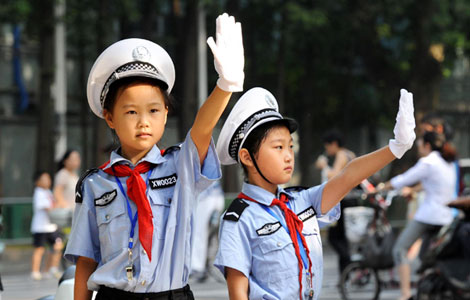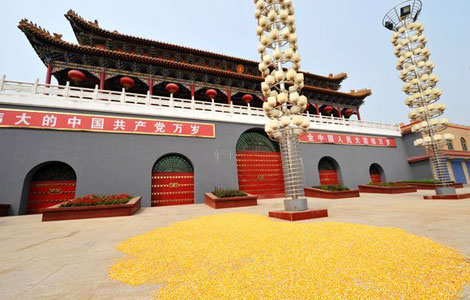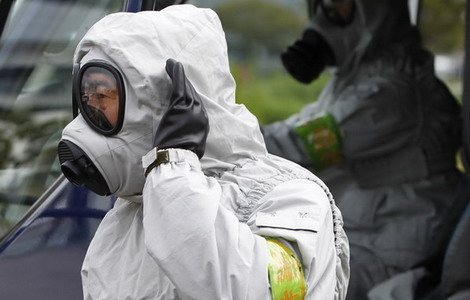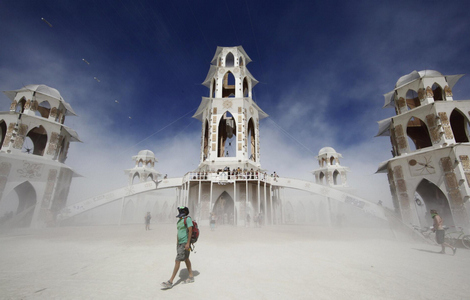World Trade Center rises from ground zero
Updated: 2011-09-02 08:16
(Agencies)
|
|||||||||||
NEW YORK - Ten years after the 9/11 attacks destroyed the World Trade Center, an 80-story glass and steel tower is rising like a phoenix from the ashes of ground zero.
The site called a "hole in the ground" for years has cranes in the air, trains running underground and hundreds of trees planted around giant, man-made waterfalls to remember the dead of Sept. 11.
And the surrounding neighborhood - no longer just a financial district - is bursting with young families, new schools, a Whole Foods and a Barnes & Noble.
Tourists squint and point their cellphones at 1 World Trade Center, once known as the Freedom Tower.
"I'm kind of proud because I was here two weeks after 9/11 and this was a dust pit," said Larry Brancato, 59, of Wallingford, Conn, walking by ground zero. "It just shows that Americans have always had a can-do attitude."
After years of inertia, and prolonged disputes between government agencies, insurer and a developer who had just taken out a 99-year lease on the towers when they were toppled, the development of the trade center is substantial, and the tallest tower can now be seen for miles.
"People can begin to see that this is no longer a hole in the middle of New York, but a real place is emerging," said architect Daniel Libeskind, whose master plan serves as a blueprint for the site.
A memorial featuring waterfalls cascading into the footprints of the twin towers will open to the public on Sept. 12, a day after families see their loved ones' names around the pools for the first time. The skyscraper formerly known as the Freedom Tower is growing by a story a week and now stands 1,000 feet above the skyline as the tallest building in lower Manhattan. A transit station and a second office tower also are taking shape.
As the trade center lay in smoking ruins in 2001, New Yorkers debated the future of the 16-acre superblock that the twin towers had dominated. Some wanted to rebuild the two 110-story skyscrapers exactly as they had been. Others said that out of respect for the nearly 3,000 dead, the entire tract should be a memorial or a park.
Larry Silverstein, the developer who signed a lease on the twin towers on July 24, 2001, pushed to rebuild the 10 million square feet of office space he had lost. Civic groups pushed for a more neighborhood-friendly design than two monoliths on a concrete plaza.
Libeskind, who won a competition to become the site's master planner, focused on the Freedom Tower, with an asymmetrical spire soared to the symbolic height of 1,776 feet and echoed the Statue of Liberty across the harbor. He set aside half the site for a memorial that left empty the spots where the destroyed towers stood, and set space aside for a performing arts center to merge culture and commerce.
Tensions were inevitable between Libeskind's artistic vision and Silverstein's desire for buildings that would draw tenants.
Now, Libeskind said, "the tensions are gone."
1 World Trade hardly resembles Libeskind's early drawings, but he called it "an impressive building."
Designed by David Childs, its tapering form is symmetrical but retains the spire and the 1,776 feet. To guard against truck bombs, the bottom 20 floors will be windowless, reinforced concrete covered by glass. The base will house infrastructure like generators and air-conditioning systems.
Critics warned that 1 World Trade would be hard to fill. Who would work in a symbolically loaded building at a location that terrorists had attacked twice? Former Gov. Eliot Spitzer once called the Freedom Tower a white elephant.
It's looking less like that now that Conde Nast has signed a lease to move its trendsetting magazines like Vogue, Glamour and Vanity Fair to 1 World Trade when the building opens in 2014.
Christopher Ward, the executive director of the Port Authority of New York and New Jersey, which owns the trade center site, called the Conde Nast agreement "a phenomenal game changer."
"The Conde Nast deal has really jump-started interest downtown," Ward said.
Under a deal between Silverstein and the Port Authority, the authority is building 1 World Trade Center on the northwest corner of the site; Silverstein wants to build three office towers on the east side of the 16 acres. The first of Silverstein's buildings, known as 4 World Trade, was up to 48 floors this week. Silverstein says the 947-foot tower designed by Japan's Fumihiko Maki will be finished before the taller 1 World Trade, catty-cornered across the site.
The Port Authority, which lost its headquarters and 85 employees on Sept. 11, will move into the second tower rising at the site when it is complete. Silverstein says other "household name" tenants will follow.
With the economy nosediving and Silverstein and the Port Authority battling over who should finance two unbuilt towers - designed by architects Richard Rogers and Lord Norman Foster - the future of those buildings looked doubtful a couple of years ago.
An analysis prepared for the Port Authority in 2009 projected that there might be no market for a third tower at the site until 2030, much less the original five planned.
Silverstein and the authority agreed to a deal last year that will let Silverstein build his second skyscraper when he raises $300 million of private equity, leases out at least 400,000 square feet and obtains financing for the remaining cost of the tower. The third building under his control - the second-tallest in the master plan - will be built when the market supports it.
Silverstein, who is 80, wants to see all of the buildings completed in his lifetime - and he says he will. He said he could get another tower up in 2015. "And if it all works out well," he says, the last one could be up a year later.
Ward was slightly less optimistic, predicting that Silverstein's towers might be completed by 2017 or 2018.
Steven Spinola, president of the Real Estate Board of New York, said that despite the still-sputtering economy, there will be a demand for a new trade center.
The average age of New York City's 500 million square feet of office space is nearly 70. "Companies want fresh, new space," Spinola said. And tax incentives intended to spur redevelopment after 2001 make the trade center cheaper than other Manhattan buildings.
Tax breaks also fueled residential growth, and the population of downtown Manhattan below Chambers Street - the area that encompasses the trade center - has doubled since 2001.
Tara Stacom, a vice chairman of real estate firm Cushman & Wakefield who is in charge of leasing 1 World Trade, said the building's proximity to attractive residential neighborhoods is a selling point.
Other trade center projects include Michael Arad's memorial, the museum scheduled to open next year and Spanish architect Santiago Calatrava's transportation hub, designed to look like a bird in flight. The hub will eventually include restaurants and stores, restoring one of the largest shopping centers that used to sit at the base of the trade center.
The transit hub, which will serve as a gateway to New York for tens of thousands of daily New Jersey commuters and connect to city subway lines, has been plagued by delays and budget overruns. Its 2005 budget of $2.2 billion has ballooned to $3.4 billion and could still grow. Ward said the station will be completed by the end of 2014.
When it opens in less than two weeks, the memorial will bring thousands of people and life into a closed-off superblock that transformed from construction pit to construction site in a decade. Hundreds of trees will surround the enormous, man-made waterfalls filling the one-acre squares where the twin towers stood. The names of the victims of the Sept. 11 attacks and the 1993 World Trade Center bombing that killed six are inscribed in bronze panels.
After memorial judges said Arad's original design was too bare, landscape architect Peter Walker was brought in to add greenery. Hundreds of swamp white oak trees have been trucked in to provide a canopy over the memorial plaza.
The museum, opening next year, will feature trade center artifacts like a fire truck used to rescue people from the north tower.
Arad said the construction that surrounds the pools won't distract memorial visitors. The point of the rebuilt site, he says, was to combine quiet, contemplative spots with the city's bustle.
"The memorial was always designed to compete with all the stimuli that surround the site," he said. "We're in lower Manhattan surrounded by towers, by the sort of bustling humanity. And the memorial was always designed to really create a quiet and contemplative space in the middle of all this. It's really a clearing in the middle of the forest."
- Xinjiang to lead nation's new opening-up drive
- Spacecraft Tiangong launch delayed
- Pollution scandal brings halt to projects
- Leaders gather for Libya summit
- Iceland land deal 'purely commercial'
- China delays Tiangong-1 launch
- Gaddafi said to be in desert town
- No taxation on adding spouse's name on property
Hot Topics
Libya conflict, Gaddafi, Oil spill, Palace Museum scandal, Inflation, Japan's new PM, Trapped miners, Mooncake tax, Weekly photos, Hurricane Irene
Editor's Picks

|

|

|

|

|

|







